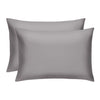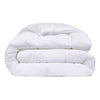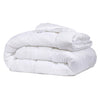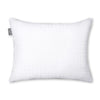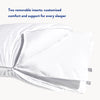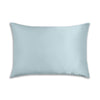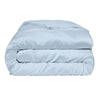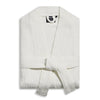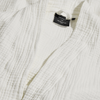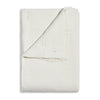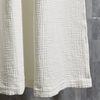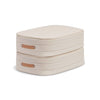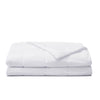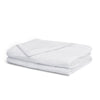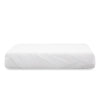The Daily Miracle
Organic Cotton vs Regular Cotton
Published
April 26, 2024
Author
Bridget Reed

When it comes to picking out the perfect cotton, it’s not just about touch or thread count — it’s about making an informed choice. Organic cotton and regular cotton, two contenders in the textile arena, offer more than just material for your next favorite shirt or coziest sheets.
This conversation is bigger, touching on environmental impact, health benefits, and ethical considerations. We’re setting the stage to explore these two options, delving into what sets them apart and why it matters.
Whether you’re already leaning toward one or still sitting on the fence, understanding the broader implications of your choice can make all the difference. Let’s start unraveling the tale of organic cotton versus regular cotton.
Understanding Cotton
Cotton: it's not just the fabric of our lives but part of a much larger conversation about sustainability and ethics in the textile industry. For generations, cotton has been the go-to material for everything from the clothes on our backs to the sheets we sleep in.
But as our society becomes more attuned to the environmental and ethical ramifications of our choices, the distinction between organic and regular cotton becomes more pronounced. Each type tells a story — traditional farming practices versus a more sustainable approach and the impact of these practices far beyond the cotton fields, from water use to the health of those involved in its production.
What Is Regular Cotton?
On one side, we have regular cotton, the industry staple that's been around the block. This is the cotton grown in vast monocultures, doused with synthetic pesticides and fertilizers to boost production to meet global demand. While it's given us abundance, cotton is not without its downsides.
The environmental toll is hefty, with issues like soil degradation, water pollution, and a negative impact on local wildlife coming to the forefront. But it's not just the planet that bears the burden — there are real human costs, too.
Farmers and workers in the cotton industry often face exposure to these harsh chemicals, raising serious health concerns. Plus, the economic implications of sticking to these conventional methods can't be ignored, as they often prioritize short-term yields over long-term sustainability and health.
What Is Organic Cotton?
Organic cotton offers a beacon for change in the textile industry, signaling a move towards more earth-friendly and people-friendly practices. This cotton is grown in harmony with nature without resorting to the chemical crutches that conventional cotton leans on.
Instead, it thrives on the strengths of natural processes to maintain soil health, use water more efficiently, and support the critters and plants that make an ecosystem vibrant. But the goodness of organic cotton doesn't stop at the farm gate.
It reaches all the way to the farmers, who no longer have to handle toxic substances, and to consumers, who can rest easy knowing their fabric choices are helping rather than harming the planet. Choosing organic cotton means wearing your values on your sleeve — literally — opting for a product that's cleaner for the earth, safer for its people, and just as soft and durable as its conventional counterpart.
How Does the Environmental Impact Compare?
Laying out organic and regular cotton side by side, the environmental benefits of going organic are stark. Imagine two fields: one buzzing with the life that thrives on organic practices and the other, a silent testament to the toll taken by synthetic aids.
Using techniques that mimic natural processes, organic farmers manage pests and weeds without chemical warfare, preserving the health of the land and the life it supports. These practices are an investment in the future of the farm and the planet, ensuring that the soil remains fertile and waterways stay clean.
The contrast with conventional cotton, which often leaves land thirstier and less alive, highlights a choice between sustaining life or depleting it. By choosing organic, consumers play a part in a larger story of environmental stewardship.
What About Cotton Bed Sheets?
Cotton sheets have long been celebrated for their comfort and durability, serving as the go-to choice for many seeking a restful night, and based on everything we’ve talked about, organic cotton is the no-brainer choice. That said, it’s important that we all stay open to evolving past the tried-and-true in our quest for sleep perfection.
Our Miracle Made® Sheet Sets are made from eucalyptus and antimicrobial silver. They have all the softness, sustainability, and breathability benefits of cotton, with the added benefit of simply being better.
While traditional cotton sheets offer breathability, eucalyptus fibers take this a step further by providing unparalleled temperature regulation. This means staying cool on hot nights and snug when the mercury dips, effectively reducing night sweats and promoting uninterrupted sleep.
But our sheets aren’t just made with eucalyptus. They’re also infused with antimicrobial silver, which acts as a shield against the unseen enemies of sleep quality — bacteria and odors.
By preventing up to 99.7% of bacteria growth, Miracle Made® Sheets tackle the root cause of odors, acne, and other skin irritations, ensuring that your skin remains clear and your sleep environment stays fresh.
This antimicrobial action means sheets need laundering up to three times less often than traditional cotton, saving time and preserving the fabric's luxurious softness, which makes them a real standout in the bamboo vs cotton debate.
What About Bath Towels and Linens?
Cotton has long reigned supreme in the realm of bath towels, linens, and bath robes, prized for its natural absorbency, comfort, and durability. The tactile pleasure of wrapping yourself in a soft, plush cotton towel after a shower is one of life's simple luxuries. However, traditional cotton towels, while comfortable, can harbor bacteria and odors, diminishing their freshness over time.
This is where our innovative Miracle Made® Bath Towel sets stand out, revolutionizing how we think about bath linens. By infusing premium long-staple cotton with antimicrobial silver, Miracle Made® Towels offer a groundbreaking solution to the age-old problem of musty towels.
This blend not only retains the inherent benefits of cotton — such as maximum absorbency and a luxuriously soft feel — but also introduces the powerful antibacterial properties of silver. The result is a towel that prevents up to 99.7% of bacteria growth, ensuring your linens stay fresher for longer.
Ultra-plush, incredibly absorbent, and designed to stay fresh for up to three times longer, our towels offer a perfect blend of tradition and innovation, ensuring that what touches your skin is nothing short of miraculous and giving you the best way to make use of high-quality cotton in your home.
The Bottom Line
As we wrap up our dive into the world of organic versus regular cotton, it's clear this isn't just a choice between two types of fabric — it's a decision that ripples through our environment, touches on our health, and resonates with ethical production values.
Both options come with their own set of benefits and considerations, painting a picture that’s as complex as it is compelling. Armed with knowledge about the impacts of organic and regular cotton, you’re now better positioned to choose sheets, towels, and clothing that align not just with your comfort preferences but with your values, too.
Sources:
What Is Cotton | Learn Genetics
US Cotton’s Sustainability | National Cotton Council
Antibacterial Silver | National Library of Medicine
Organic Cotton and Its Environmental Impacts | Springer Link


